The Illinois Philharmonic in Concert – A Review by Dana Paul Perna
Comments Off on The Illinois Philharmonic in Concert – A Review by Dana Paul PernaApril 1, 2024 by Admin
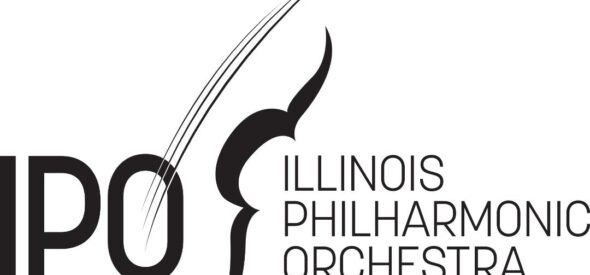
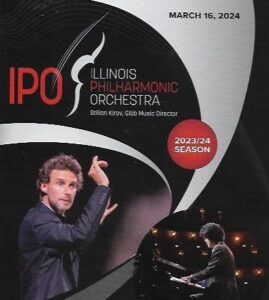
Illinois Philharmonic Orchestra, Stilian Kirov, conducting
Elizabeth Huffman, Violin
Anima-Glen Ellyn Children’s Chorus, Evan Bruno, Artistic Director
Chicago High School for the Arts, Charles Taylor, Music Director
Ozinga Chapel @ Trinity Christian College, Palos Heights, Illinois
Saturday, March 16, 2024 @ 3:00 pm
PROGRAM:
Claude Debussy (arr. Hubert Mouton): Suite Bergamasque
Ralph Vaughan Williams: The Lark Ascending
Elizabeth Huffman, Violin
Augusta Read Thomas: Gwendolyn Brooks Settings
World Premiere
On Saturday, March 16, 2024, the Illinois Philharmonic Orchestra, under the baton of their Music Director, Stilian Kirov presented a concert celebrating poetry that included a world premiere of a composition for Children’s chorus and orchestra in which poetry served as its text.
As a prelude to the concert, the Honorable Joseph Woods, Mayor of Park Forest, Illinois was introduced. Having received an award from Gwendolyn Brooks (1917-2000 – seen at left) when he was a youth, he proceeded to recite one of her poems prior to eloquently speaking about her, explaining what the catalyst for this afternoon’s concert was. Before Maestro Stilian Kirov appeared to present the first downbeat, everything had become anchored to the poetry-inspired music that was to commence.
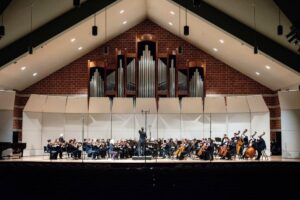
The concert opened with Suite Bergamasque by Claude Debussy (1862-1918) as orchestrated by the Belgian-born French arranger Hubert Mouton (1872-1954). In four movements, the most memorable of which being its third, the eternally popular “Clair de lune”, the title for the entire composition derives from a poem of the same name by Paul Verlaine (1844-1896) as follows in an excerpt presented here in an English translation:
“Your soul is a chosen landscape
On which masks and Bergamasques
cast enchantment as they go,
Playing the lute, and dancing, and all but
Sad beneath their fantasy-disguises.”
There are any number of orchestrations, and/or arrangements of “Clair de Lune” apart from its other three movements, but Mouton is among the few to have orchestrated the entire suite, its order consisting of ‘Prelude’, ‘Minuet’, ‘Clair de Lune’, and ‘Passepied’. Mouton was an arranger/orchestrator who, during his career, prepared many a scoring for what were once referred to as “theater orchestras”. In the instance of this opus, he took a piano composition, arranging if for a small orchestra, while at other times, he set music from the orchestral and opera realms, reducing their larger forces for smaller ones. (In America, these would have been called “stock charts,” or, “stocks” for short.) Debussy was merely one composer Mouton adapted as a way of supplying music for what was once considered “popular programming” for symphonic concerts.
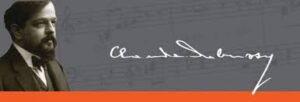 The original piano suite is one of the works that achieved success for Debussy early on, and there are reasons for that. Melodious, mood-driven, magnificently crafted, harmonically rich, expressive, elegant, and yes, popular – no wonder it appears in the repertory of many of the top piano virtuosi even in our current time. On the other hand, while I have known of Mouton’s orchestration to this entire suite, until this concert, I had never heard it…..and I hope to never encounter it again. Whilst Mouton’s scoring of Debussy’s “Petite Suite” is the standard used in symphonic concerts, his efforts this time did not arrive at the same level. Whereas Debussy created a painting, Mouton rendered it as a mere charcoal-on-paper. This does NOT negate the high quality performance the Illinois Philharmonic Orchestra, under their music director Stilian Kirov’s baton, gave it. The tempi reflected those one would encounter as if performed on piano, meaning that it was never turgid, nor sluggish. Also, Kirov never allowed it to become overly romanticized, maintaining its classicistic parameters. Whatever energies were given to its presentation, the problem rest with the drabness of the orchestration, not with the skillful forces presenting it. The musicians were working with what was in front of them as best they could, if not better than.
The original piano suite is one of the works that achieved success for Debussy early on, and there are reasons for that. Melodious, mood-driven, magnificently crafted, harmonically rich, expressive, elegant, and yes, popular – no wonder it appears in the repertory of many of the top piano virtuosi even in our current time. On the other hand, while I have known of Mouton’s orchestration to this entire suite, until this concert, I had never heard it…..and I hope to never encounter it again. Whilst Mouton’s scoring of Debussy’s “Petite Suite” is the standard used in symphonic concerts, his efforts this time did not arrive at the same level. Whereas Debussy created a painting, Mouton rendered it as a mere charcoal-on-paper. This does NOT negate the high quality performance the Illinois Philharmonic Orchestra, under their music director Stilian Kirov’s baton, gave it. The tempi reflected those one would encounter as if performed on piano, meaning that it was never turgid, nor sluggish. Also, Kirov never allowed it to become overly romanticized, maintaining its classicistic parameters. Whatever energies were given to its presentation, the problem rest with the drabness of the orchestration, not with the skillful forces presenting it. The musicians were working with what was in front of them as best they could, if not better than.
Next on the program came The Lark Ascending by Ralph Vaughan Williams (1872-1958); the concluding work on this concert’s first half. As it was stated before this work was performed, the Illinois Philharmonic Orchestra likes to feature members from within its forces to serve as their soloist. In this case, those solo duties fell to the orchestra’s Assistant Concertmaster, Elizabeth Huffman who more than admirably represented “The Lark” in all its flights of agrarian translucence. Her colleagues, along with Maestro Kirov, skillfully afforded her the delicate support this score requires. On the surface, due to its lack of overt flashiness, one would not consider this a soloist’s showpiece as they would, say, a concerto by Tchaikovsky, or Brahms, however, that all has to do with Vaughan Williams’ formidable skills of subtle content within an expressive context. Due to its level of refinement, The Lark Ascending poses its own set of challenges, equal to, if not more so, than any number of concerted works in the violinists’ repertory. Exposed as everything is, if anyone is off, even in the slightest, especially the soloist, everyone hears it, rendering the effect distorted.
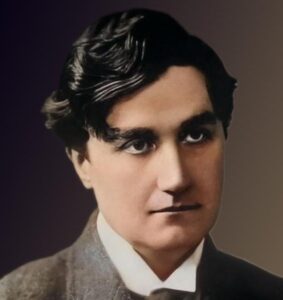 Based upon a 122-line poem of the same name by the English poet George Meredith (1828-1909), Ralph Vaughan Williams quoted only 12 of them to serve as the inspiration for this 15 minute “romance” for violin and small orchestra. Begun in 1914, work on this opus was interrupted due to World War I, Vaughan Williams completing it for violin and piano after War’s end by 1920. Composed for the work’s dedicatee, violinist Marie Hall (1884-1956), its concerted version was given its world premiere in London on 14 June 1921 by the British Symphony Orchestra, Adrian Boult, conducting, with Ms. Hall serving as soloist. While I have often heard it stated that this is “not Vaughan Williams’ best work”, it is ironic, therefore that, in its published form, since its manuscript is lost, this composition has taken its place as being one of the most performed of Vaughan Williams’ justifiably celebrated output; its subtle understatement, pastoral character, and folk-infused tunes belay the Master’s skills of harmony, counterpoint, nuance, and orchestration.
Based upon a 122-line poem of the same name by the English poet George Meredith (1828-1909), Ralph Vaughan Williams quoted only 12 of them to serve as the inspiration for this 15 minute “romance” for violin and small orchestra. Begun in 1914, work on this opus was interrupted due to World War I, Vaughan Williams completing it for violin and piano after War’s end by 1920. Composed for the work’s dedicatee, violinist Marie Hall (1884-1956), its concerted version was given its world premiere in London on 14 June 1921 by the British Symphony Orchestra, Adrian Boult, conducting, with Ms. Hall serving as soloist. While I have often heard it stated that this is “not Vaughan Williams’ best work”, it is ironic, therefore that, in its published form, since its manuscript is lost, this composition has taken its place as being one of the most performed of Vaughan Williams’ justifiably celebrated output; its subtle understatement, pastoral character, and folk-infused tunes belay the Master’s skills of harmony, counterpoint, nuance, and orchestration.
Once the music begins, followed by the violinist’s entrance, whatever it is that he did, the music he created continues to cast its spell over an audience, just as it did this time. About the only moment where the music swells to anything approaching “loud” occurs near the 4:30 mark when Vaughan Williams bestows his signatory musical hug upon his listeners; those rich sonorities from such small forces wrapping themselves around everyone like an invitation to “enter his house” – the Master, once again, having signed his canvas.
One of the unique features of this opus is the fact that the violin concludes the work alone for its final minute-and-a-half. As Ms. Huffman tastefully performed its final highest D-to-final-B gesture, this audience was held breathlessly spellbound through Vaughan Williams’ representation of Meredith’s final two lines:
“Till lost on his aerial rings,
In light, and then the fancy sings”
in a manner that, after a century still remains so appropriate. Nothing else needs to have been stated as “The Lark,” having finally taken wing, ascended onward towards eternity.
After intermission had concluded, the highlight of this concert was presented, specifically Gwendolyn Brooks Settings by renowned composer Augusta Read Thomas (b. 1964) in its World Premiere performance. The title states it all, yet, while I cannot reprint the poems by Gwendolyn Brooks Ms. Thomas selected to utilize, for those among you reading this who are interested, these consisted of the following poems derived from “Bronzeville Girls and Boys” (1956, published by HarperCollins Publishers): ’Tommy’, ‘Cynthia in The Snow’, ‘Robert Who is Often a Stranger to Himself’, ‘De Koven’, ‘Mexie and Birdie’, ‘Marie Lucille’, and ‘The Admiration of Willie’.
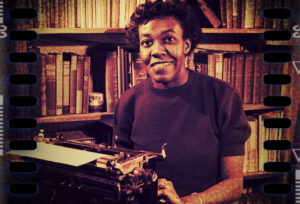 Noted poet Gwendolyn Brooks became the first Black female to have received the Pulitzer Prize in May 1950 for “Annie Allen.” Her poetry marks a high benchmark in American Literature; her writings imbued with a sense of purpose, precision, personality, sensitivity, and humanity that remain timeless despite changing tastes, trends, and ethics (or lack there-of in terms of the latter in our present time of unconsciousness). While she was born in 1917 in Topeka, Kansas, she only lived there for the first six weeks of her life before her family moved to the Southside of Chicago where Ms. Brooks grew up, and lived for the rest of her life. As she put it: “I am an organic Chicagoan. Living there has given me a multiplicity of characters to aspire for…That’s my headquarters.” It is no wonder that she was appointed Poet Laureate of Illinois in 1968, a position she held until her death 32 years later, along with having been named the United States Poet Laureate for the 1985–86 term.
Noted poet Gwendolyn Brooks became the first Black female to have received the Pulitzer Prize in May 1950 for “Annie Allen.” Her poetry marks a high benchmark in American Literature; her writings imbued with a sense of purpose, precision, personality, sensitivity, and humanity that remain timeless despite changing tastes, trends, and ethics (or lack there-of in terms of the latter in our present time of unconsciousness). While she was born in 1917 in Topeka, Kansas, she only lived there for the first six weeks of her life before her family moved to the Southside of Chicago where Ms. Brooks grew up, and lived for the rest of her life. As she put it: “I am an organic Chicagoan. Living there has given me a multiplicity of characters to aspire for…That’s my headquarters.” It is no wonder that she was appointed Poet Laureate of Illinois in 1968, a position she held until her death 32 years later, along with having been named the United States Poet Laureate for the 1985–86 term.
It seemed most appropriate that Ms. Brooks, a former University of Chicago faculty member (that marked her first teaching experience), was chosen to serve as the texts with which a current professor at the same institution selected to set to music in such an extended expression, equally as personally drafted as Ms. Brooks penned her poetic locutions. Both Ms. Thomas and Ms. Brooks share another honor in common: both were inducted into the American Academy of Arts and Letters.
 With all that as a lead in, turning to the composition Augusta Read Thomas forged into being between 2018 to 2020, Gwendolyn Brooks Settings is an expansive tableau in six parts for Children’s Chorus and orchestra that runs a half-hour in duration. Once her composition propels itself at its outset, it does not stop until everyone arrives at its final measure. In terms of this work, every aspect of her well crafted opus progresses constantly forward, moving from texture to texture, layering sonorities in contrast with other sonorities, thereby creating a dramatic concoction that she brilliantly formed into a unique hybrid of symphonic song-cycle, soundscape, and symphony. Many lines were derived from sustained pitches that created an ongoing weave; instruments sounding a pitch that became hocketed to the singers. Woodwinds and brass would, characteristic of the Thomas sound, punctuate her reverberant-fabric, while strings supplied supportive surfaces as the action progressed. There were moments of repose, only to resume energetically again. Her use of the chorus was integrated stylistically within the parameters she braided their participation into a quilt of sound. Of particular note were the materials she created for the percussion section, including one moment when multiple triangles were simultaneously struck fortissimo. While that temporary tingling-tinnitus moment that was ringing in my ears has finally subsided, the memory of it has yet to fade from my mind.
With all that as a lead in, turning to the composition Augusta Read Thomas forged into being between 2018 to 2020, Gwendolyn Brooks Settings is an expansive tableau in six parts for Children’s Chorus and orchestra that runs a half-hour in duration. Once her composition propels itself at its outset, it does not stop until everyone arrives at its final measure. In terms of this work, every aspect of her well crafted opus progresses constantly forward, moving from texture to texture, layering sonorities in contrast with other sonorities, thereby creating a dramatic concoction that she brilliantly formed into a unique hybrid of symphonic song-cycle, soundscape, and symphony. Many lines were derived from sustained pitches that created an ongoing weave; instruments sounding a pitch that became hocketed to the singers. Woodwinds and brass would, characteristic of the Thomas sound, punctuate her reverberant-fabric, while strings supplied supportive surfaces as the action progressed. There were moments of repose, only to resume energetically again. Her use of the chorus was integrated stylistically within the parameters she braided their participation into a quilt of sound. Of particular note were the materials she created for the percussion section, including one moment when multiple triangles were simultaneously struck fortissimo. While that temporary tingling-tinnitus moment that was ringing in my ears has finally subsided, the memory of it has yet to fade from my mind.
Credit must be given to the outstanding musicianship of the Illinois Philharmonic Orchestra, and Maestro Kirov for pulling, and supporting all the forces together more than admirably. Without the committed work by Anima-Glen Ellyn Children’s Chorus, Chicago High School for the Arts and their directors Evan Bruno, and Charles Taylor, respectively, none of this would have rendered the desired resonance Ms. Thomas’ work – and, most especially, Ms. Brooks’ words – required. The total of its parts created a most rewarding presentation of a new composition as the appropriate conclusion for a well-attended concert built around poetry; the performers receiving a most well deserved, and enthusiastic response from the audience…..however……
….while that concludes this concert’s review, that was not the end for this new opus. The forces that presented this world premiere reassembled the following day to record Gwendolyn Brooks Settings by Augusta Read Thomas that shall appear on the Cedille Records label marking, not only the world premiere recording of her composition, but, additionally, the international debut of the Illinois Philharmonic Orchestra to appear over commercial audio platforms.
Dana Paul Perna
March 2024
Comments Off on The Illinois Philharmonic in Concert – A Review by Dana Paul Perna
Sorry, comments are closed.

